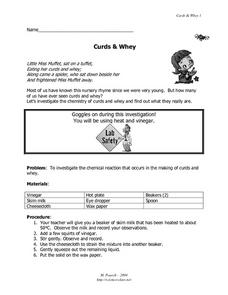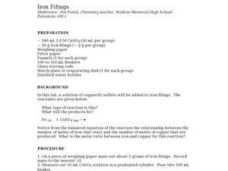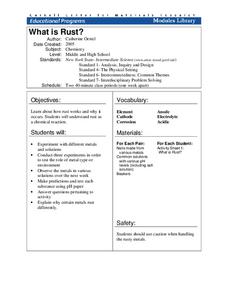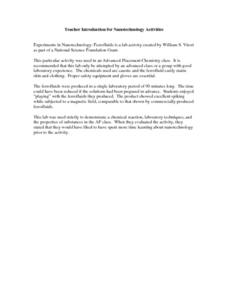National Nanotechnology Infrastructure Network
Synthesis and Characterization of CdSe Quantum Dots
Does the size of a sample change the physical properties of that substance? It turns out it can! Young scientists combine physics and chemistry to synthesize CdSe quantum dots and record their color properties. Learners should notice a...
Curated OER
Activity #3 Are Particles "Real?"
Students verbalize a simple particle theory, They apply their particle theory to explain what happens during chemical reactions and how this theory supports the law of conservation of matter. Pupils comprehend that the atomic theory,...
Curated OER
Curds and Whey
In this chemical reaction worksheet, students investigate the reaction that makes curds and whey. They mix milk and vinegar and run it through cheesecloth to collect the solid. Students make observations, read about curds and whey, and...
Curated OER
Properties and Perfectly Polymeric Sodas
Pupils examine physical and chemical properties of plastics, interfaces of plastics, and forms of plastics. In three lab activities, students discover the two characteristic responses of plastics to heating, thermoplastic or thermosetting.
Curated OER
Chemistry: Balancing Chemical Equations
Eighth graders practice balancing chemical equations. In this chemistry lesson plan, 8th graders explain why it is necessary to balance equations. They complete practice worksheets individually.
Curated OER
Synthesis Reactions
Tenth graders write and balance chemical equations and make a PowerPoint presentation on synthesis reactions.
Curated OER
Bhopal - Covalent Bonding
Using the chemicals that leaked in the Bhopal gas tragedy of 1984, chemists examine covalent bonds. Provide for them the chemical reactions and have them draw Lewis diagrams for the molecules involved. That's about all there is to the...
Curated OER
Iron Filings
Students conduct an experiment in which a solution of copper(II) sulfate is added to iron filings. They write and balance the equation for the reaction that occurs and calculate the amount of iron that reacted and the percent yield of...
Curated OER
"Boy Meets Chemistry... and has a Reaction!"
Students identify the four main types of reactions: synthesis, decomposition, single replacement, and double replacement. They explore the four main types of chemical reactions through an analogy of "Boy Meets Girl" and then "act out"...
Curated OER
Activity #9 Tye Green Blob
Students comprehend that a chemcial change produce substances with a different composition and physical and chemcial properties. They state the differences between physical and chemical changes. Pupils observe changes that occur during...
Curated OER
Activity #13 Changing The Look of Sugar
Students observe what happens when sugar is dissolved in water and when it is heated. They weigh the products after each of the two experiments on a balance scale. Pupils distinguish between physical and chemical changes. Students are...
Curated OER
Activity #15 The Snowy Christmas Tree
Middle schoolers weigh out the proper amount of silver nitrate and prepare the silver nitrate solution. They observe what occurs when pure copper is added to silver nitrate solution. Pupils determine whether the change in the appearance...
Curated OER
Electrolysis
Students conduct a series of experiments on water electrolysis. In this chemistry instructional activity, students explain what happens to the molecules during the process. They cite real world applications of electrolysis.
Virginia Department of Education
Acids and Bases
What did one titration say to the other titration? We should meet at the end point! Young chemists perform four experiments: dilute solution, neutralization, titration, and figuring pH/pOH.
Cornell University
What Is Rust?
Why do metals rust differently? Scholars experiment with metal combinations in a hands-on activity. They create unique environments with different metals and compare the rate and amount of rust for each.
Beyond Benign
Is It Easy Being Green Game Show
Is it possible to create an environmentally friendly shampoo? Learners accept this challenge in the fifth lesson in a green chemistry series of 24. The analysis of their shampoo ingredients must address pH, exothermic reactions, and...
Curated OER
Determination of Equivalent Weight of an Acid
In this chemistry worksheet, students look for the weight of acid and examine its mass using chemical equations and a laboratory procedure.
Curated OER
Rusting-A Form of Oxidation
Students observe the rusting process in the lab. In this chemistry lesson, students rank metals according to their conductivity. They give real world applications of this activity.
Earth Day Network
Staying Green While Being Clean
Clean up the environment with a lesson plan that focuses on replacing hazardous cleaning supplies with green, environmentally-friendly products. Using a dirty patch of surface as a control area, kids clean other parts of various surfaces...
Curated OER
Observation and Stimulation of bioluminescence and chemiluminescence
Students are introduced to chemical reactions, reaction rates, chemiluminescence, fluorescence and bioluminescence. They use glow sticks are used to demonstrate the effect of temperature on the rates of chemical reactions. Pupils recall...
Curated OER
Fertilizers, Pesticides and Human Health
Students define several vocabulary terms related to chemicals and toxicology. Students calculate chemical concentrations in water and explain the toxicological principles that govern safety of substances. Students conduct an...
Curated OER
Rate Determining Step and Catalyst Activity
Students work in groups to stuff as many envelopes as they can in 3-5 minutes. They use an assembly line method. Envelope stuffing is compared to a chemical reactions. The idea of catalyst is considered, and students determine a way to...
Curated OER
Experiments in Nanotechnology: Ferrofluids
Students explore the world of nanotechnology by synthesizing ferrofluids in a series of chemical reactions. In small groups, they follow the procedure to create the ferrofluids using precise measuring techniques. They test the resulting...
Curated OER
Disposable Diaper Comparison and Mystery Powder Identification
Students investigate which diaper is the most absorbent. In this chemistry lesson, students calculate how much water is absorbed by diapers. They identify an unknown powder based on physical and chemical properties.

























